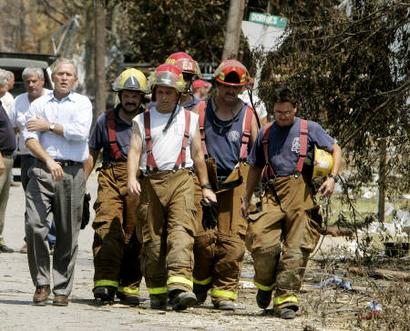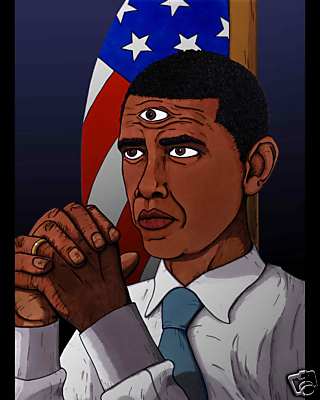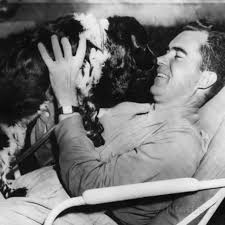“They want to kill me and my children if they can. But if they just kill me and not my children, they want my children to be comforted — that while they didn’t protect me because they cut my taxes, my children won’t have to pay any money on the money they inherit,” Paul Begala said. “That is bullshit national defense, and we should say that.”
That was an odd piece of demogaugery said by Paul Begala that Michelle Malkin and others pounced on over a month ago. Bush Administration wants to kill us all? Bush Administration isn’t protecting us while they cut taxes (and note the Estate Tax is alluded to.) This is just insane rhetoric, with no kernal of truth down in it!
There are strange synchonicities with this Bush administration. He takes a vacation during August of 2001, the first year of his first term. At the time and after some early successes in enacting his policies, his presidency is starting to fall apart and it’s easy to imagine him stumbling to an inglorious one-term presidency. He comes back from vacation, and is greeted with September 11. He’s a bit slow on the uptake… My Pet Goat, an uneasy flight to Nebraska. Americans want to believe in him, though, and thus when he comes to he is transformed to a president with a 90% approval rating.
He takes a vacation during August of 2005, the first year of his second term. His presidency is seen falling apart on a number of fronts. The vacation is not easy — Cindy Sheehan is upstaging the man. Right at the end of his vacation, Hurricane Katrina hits the Gulf Course. He is slow on the uptake. He takes 90 seconds to address the situation within a much larger speech designed to tie the War In Iraq into the Glories of World War Two. He… well…
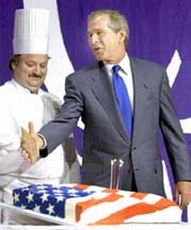
This was Bush slicing up a piece of cake in celebration of John McCain’s birthday. The line “Let them eat cake” doesn’t quite fit here, because… I think the victims of the post-hurricane flooding wouldn’t mind eating cake right about now.
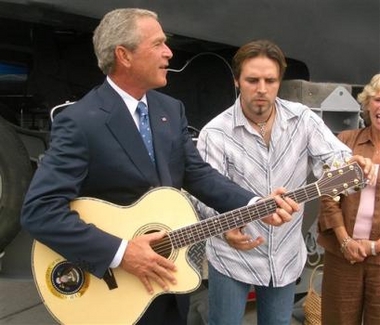
Something about Nero, Rome, fiddling, and burning.
I notice patterns here. Bush was also painfully slow in comprehending the Asian Tsunami. He eventually came to, and let flow the much needed aid, but it appears to me … he cannot comprehend.
MS. MORNIN: That’s good, because I work three jobs and I feel like I contribute.
THE PRESIDENT: You work three jobs?
MS. MORNIN: Three jobs, yes.
THE PRESIDENT: Uniquely American, isn’t it? I mean, that is fantastic that you’re doing that. (Applause.) Get any sleep? (Laughter.)
This may explain why he couldn’t get into gear solving the first rule of occupation: the electricity, the water, the norms of life must flow. It didn’t occur to Bush Administration.
Analogious to the lack of comprehension with New Orleans and up the Gulf Coast, and the failure to deliver aid. To a group some right-wing punditry has falsely called “those who chose to stay”. (Note to any extra-fundamentalist Christian who cites New Orleans’ sinful ways as the cause of God’s Wrath upon the city: the “Sin” tourists left and who remained… Black Baptists… poor, mostly Christian Evangelical people living outside of the city. And what about the people in rural Mississippi? The Sin-drenched got away!)
Consider Scott McClellan saying in his press gaggle that the Bush Administration has a no tolerance pledge for looting. Consider his answer when someone pointed out that by and large, they’re looting for necessities, out of desperation: food, diapers, shoes… the answer complete tripe that they’ll get the necessary supplies. (This was at a time when Bush hadn’t yet retrained the official line from “This is a successful relief effort” to “Totally unacceptable.)
The answer is tantamont to the Paul Begala line I threw out at the start. They don’t care. They just told them to “Go home and die.” A bit unbelievable?
“I don’t think anybody anticipated the breach of the levees.” Thus saideth the president on September 1, 2005. And I experience dejavu… except this time, I myself wasn’t anticipating the breach of the levees — because unlike circumstances relating to Iraq or even an understanding I had pre-9/11 that terrorists would strike the United States, news of New Orleans disaster preparedness was not something I was cognicent of. But the experts knew it!
Anyone watched Bill Moyers on September 20, 2002?
National Geographic Magazine, October 2004:
.
The storm hit Breton Sound with the fury of a nuclear warhead, pushing a deadly storm surge into Lake Pontchartrain. The water crept to the top of the massive berm that holds back the lake and then spilled over. Nearly 80 percent of New Orleans lies below sea level—more than eight feet below in places—so the water poured in. A liquid brown wall washed over the brick ranch homes of Gentilly, over the clapboard houses of the Ninth Ward, over the white-columned porches of the Garden District, until it raced through the bars and strip joints on Bourbon Street like the pale rider of the Apocalypse. As it reached 25 feet (eight meters) over parts of the city, people climbed onto roofs to escape it.
Thousands drowned in the murky brew that was soon contaminated by sewage and industrial waste. Thousands more who survived the flood later perished from dehydration and disease as they waited to be rescued. It took two months to pump the city dry, and by then the Big Easy was buried under a blanket of putrid sediment, a million people were homeless, and 50,000 were dead. It was the worst natural disaster in the history of the United States.
When did this calamity happen? It hasn’t—yet. But the doomsday scenario is not far-fetched. The Federal Emergency Management Agency lists a hurricane strike on New Orleans as one of the most dire threats to the nation, up there with a large earthquake in California or a terrorist attack on New York City. Even the Red Cross no longer opens hurricane shelters in the city, claiming the risk to its workers is too great.
AND… a listing from early 2001 of the biggest threats to face the United States:
New Orleans is sinking.
And its main buffer from a hurricane, the protective Mississippi River delta, is quickly eroding away, leaving the historic city perilously close to disaster.
So vulnerable, in fact, that earlier this year the Federal Emergency Management Agency ranked the potential damage to New Orleans as among the three likeliest, most castastrophic disasters facing this country.
The other two? A massive earthquake in San Francisco, and, almost prophetically, a terrorist attack on New York City.
Who is Bush talking about? I don’t know. It’s … uncomfortable details. Cut FEMA, cut the breeching of the levees… we have a war to fight in Iraq for some reason or other… we have taxes to cut.
Did I mention that Estate Tax which is at the top of the priority list of Congress (where do these guys get the galls?)… which Paul Begala demagauged that Bush wanted to kill us all for?
